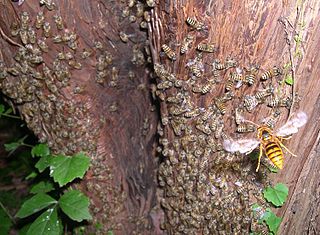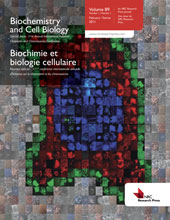
Fukui Prefectural University is a public prefectural university founded in 1992 in Eiheiji, Yoshida District, Fukui Prefecture, Japan. It has undergraduate faculties in economics, biotechnology, marine bioscience, and nursing and social welfare sciences. There are graduate programs in economics and business administration, bioscience and biotechnology, and nursing and social welfare science.
The Virginia Biotechnology Association (VABIO) is the statewide trade group that promotes the scientific and economic impact of the biotechnology industry in the Commonwealth of Virginia.

The Manchester Institute of Biotechnology, formerly the Manchester Interdisciplinary Biocentre (MIB) is a research institute of the University of Manchester, England. The centre has been designed to enable academic communities to explore specific areas of interdisciplinary quantitative bioscience, largely through the efforts of multidisciplinary research teams. Research at MIB follows three broadly defined, interdisciplinary and complementary themes: Biological Mechanism and Catalysis, Molecular Bioengineering, Systems biology.
Action Bioscience is a non-commercial, educational web site sponsored by the American Institute of Biological Sciences (AIBS). It was created to promote bioscience literacy and bring attention to seven bioscience issues of critical current importance: 1) Biodiversity, 2) Environment, 3) Genomics, 4) Biotechnology, 5) Evolution, 6) New Frontiers, and 7) Science Education

Apis cerana japonica is a subspecies of the eastern honey bee native to Japan. It is commonly known as the Japanese honey bee. This subspecies was determined, through an analysis of mitochondrial DNA, to have originally come from the Korean peninsula. They have been observed moving into urban areas in the absence of natural predators.
Frontiers in Bioscience is a peer reviewed scientific journal. It was established in 1996 and covers all biological and medical sciences. The editor-in-chief is Siamak Tabibzadeh. The journal consists of three sections: Landmark Edition, Scholar Edition, and Elite Edition, with slightly different scopes:

Biochemistry and Cell Biology is a bi-monthly, peer-reviewed scientific journal of biochemistry and cell biology established in 1964 by NRC Research Press. It is the continuation of Canadian Journal of Biochemistry and Physiology which split into Canadian Journal of Biochemistry and Canadian Journal of Physiology and Pharmacology in 1964. In 1983, Canadian Journal of Biochemistry was renamed Canadian Journal of Biochemistry and Cell Biology and acquired its current name Biochemistry and Cell Biology in 1986. The journal is edited by James R. Davie and Christopher J. Nelson.

Bioscience, Biotechnology, and Biochemistry is a monthly, peer-reviewed, scientific journal published by the Japan Society for Bioscience, Biotechnology and Agrochemistry, of which it is the official journal. It was established in 1924 as Bulletin of the Agricultural Chemical Society of Japan, which was renamed to Agriculture and Biological Chemistry in 1961. The journal took its current name in 1991.
The Chemical Society of Japan (CSJ) is a learned society and professional association founded in 1878 in order to advance research in chemistry. The mission of the CSJ is to promote chemistry for science and industry in collaboration with other domestic and global societies.
The Bioscience Resource Project is a public interest organization that describes itself as providing independent research and analysis in the agriculture-related biosciences since 2006. In 2011, they started Independent Science News, a website providing news and critical comment on topics where food, agriculture, and biotechnology impact human health and the environment.
The National Bio-science Award for Career Development or N-BIOS Prize is an Indian science award for recognizing excellence and promoting research in bio-sciences disciplines. It was instituted in 1999 by the Department of Biotechnology of the Government of India and is for encouraging Indian bio-scientists of less than 45 years of age. The award is given annually for unique contributions made towards the development of state of art in basic and applied areas of biological sciences through demonstrated activity in the form of publication in reputed journals and or patents. The award recognizes research and development work carried out in India during the last 5 years of the career. The award carries a citation, a plaque, a cash prize of ₹200,000 and a research support grant of ₹1,500,000, distributed annually in equal installments for three years. The award is considered as one of the highest Indian science awards and as equivalent to the Shanti Swarup Bhatnagar Prize given by the Council of Scientific and Industrial Research of India.
Tashkent State Agrarian University or TSAU is an agricultural university located in Tashkent, Uzbekistan.
Yoshizumi Ishino is a Japanese molecular biologist, known for his discovering the DNA sequence of Clustered Regularly Interspaced Short Palindromic Repeats (CRISPR).
Banwari Lal is an Indian environmental and industrial biotechnologist and the director of the Environmental and Industrial Biotechnology Division at The Energy and Resources Institute (TERI). Known for the development of oilzapper technology, Lal is the chief operating officer of ONGC-TERI Biotech Limited, a collaborative venture between TERI and the Oil and Natural Gas Corporation. The Department of Biotechnology of the Government of India awarded him the National Bioscience Award for Career Development, one of the highest Indian science awards, for his contributions to biosciences in 2004.
Rajendra Prasad Roy is an Indian chemical biologist, biochemist and a scientist at the National Institute of Immunology. Known for his studies in protein engineering, Roy has developed several chemo-enzymatic strategic processes for which he has a patent assigned to him. He holds a PhD from the Indian Institute of Science and is an elected fellow of all the three major Indian science academies namely Indian National Science Academy, Indian Academy of Sciences, and National Academy of Sciences, India. The Department of Biotechnology of the Government of India awarded him the National Bioscience Award for Career Development, one of the highest Indian science awards, for him contributions to biosciences in 2005.
Pradeep Kumar G. is an Indian cell biologist and a scientist at the Rajiv Gandhi Centre for Biotechnology. Known for his studies in the field of disease biology, Dr Kumar is a life member of the Kerala Academy of Sciences. The Department of Biotechnology of the Government of India awarded him the National Bioscience Award for Career Development, one of the highest Indian science awards, for his contributions to biosciences in 2006. He has also been conferred with the prestigious Labhsetwar Award (2015) and the Dr. TC Anand Kumar Memorial Oration Award (2016) of the Indian Society for the Study of Reproduction and Fertility (ISSRF) and the Subhas Mukherjee Memorial Oration Award (2017) of the Academy of Clinical Embryologists.
G. Taru Sharma is an Indian biologist and the head of the physiology and climatology division at the Indian Veterinary Research Institute of the Indian Council of Agricultural Research. Known for her studies on germ cell marker genes, Sharma is an elected fellow of the National Academy of Agricultural Sciences. The Department of Biotechnology of the Government of India awarded her the National Bioscience Award for Career Development, one of the highest Indian science awards, for her contributions to biosciences in 2006.
Ponnuraj Karthe is an Indian structural biologist and a professor and the head of the Department of Crystallography and Biophysics of the University of Madras. He is known for his research in the fields of structural biology and drug designing. His studies have been documented by way of a number of articles and Google Scholar, an online repository of scientific articles has listed 46 of them. Besides, he has contributed chapters to books edited by others and has delivered invited speeches at many seminars which include the Workshop on Advances in Computer Aided Drug Design held in August 2010 at the University of Madras. He was a member of the national organizing committee of the Annual Conference of Indian Biophysical Society - Molecular Architecture, Dynamics and Assem, organized by Saha Institute of Nuclear Physics and serves as a member of the national committee of the International Union for Pure and Applied Biophysics (IUPAB) as well as the executive council of the Bioinformatics and Drug Discovery Society (BIDDS), a non governmental organization promoting dissemination of knowledge in the fields of bioinformatics, biological sciences and other life sciences. The Department of Biotechnology of the Government of India awarded him the National Bioscience Award for Career Development, one of the highest Indian science awards, for his contributions to biosciences, in 2010.
Anirban Basu is an Indian neurobiologist, who is primarily interested in neurovirology, a senior scientist at the National Brain Research Centre, a deemed to be university, located in Manesar, Gurgaon, Haryana. Known for his studies on disease-biology such as Japanese encephalitis, Basu is an elected fellow of all the three major Indian science Academies namely the Indian Academy of Sciences, the Indian National Science Academy and the National Academy of Sciences, India as well as of the West Bengal Academy of Science and Technology. The Department of Biotechnology of the Government of India awarded him the National Bioscience Award for Career Development, one of the prominent Indian science awards, for his contributions to biosciences and biotechnology, in 2010.

The Journal of Bioscience and Bioengineering is a monthly peer-reviewed scientific journal. The editor-in-chief is Junichi Kato. It is published by The Society for Biotechnology, Japan and distributed outside Japan by Elsevier. It was founded in 1923 as a Japanese-language journal and took its current title in 1999.






